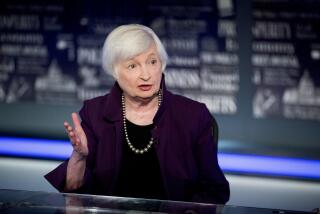S&P; Trims Credit Rating on 5 Big Banks
- Share via
NEW YORK — A major credit rating firm lowered its ratings for five of the nation’s biggest banking companies Monday, citing their continued exposure to troubled foreign loans.
The change was Standard & Poor’s Corp.’s second downgrade affecting the banking industry in less than a year due to its concerns about the Third World debt problem. All but two of the affected securities issues, totaling about $24 billion, remained investment quality.
At the same time, S&P; affirmed the credit ratings of Citicorp, Bankers Trust New York Corp. and J. P. Morgan & Co. due in part to their low or declining exposure to the debt of less developed countries.
Ratings were lowered for Chase Manhattan Corp. of New York, the nation’s second-largest bank holding company; BankAmerica Corp. of San Francisco, No. 3; Chemical New York Corp. of New York, No. 4; Manufacturers Hanover Corp. of New York, No. 6, and First Chicago Corp. of Chicago, No. 11.
The ratings help determine interest rate levels for companies borrowing money in the credit markets. Securities covered by the rating changes include long- and medium-term debt, commercial paper, letters of credit, certificates of deposit and preferred stock.
‘Exposure Makes It Difficult’
All the changes were based on the banking companies’ 1987 financial performances, with special attention given to the effect of loans to less developed countries on the banks’ profits and capital.
“The debt load of Latin American and other LDCs continues to impose short-term debt-servicing and long-term asset quality problems,” S&P; said in a statement. “While banking institutions restructure their businesses to focus on profitable segments, exposure to LDCs . . . will make it difficult to implement constructive new strategies.”
Many major banks recently reported losses or sharply diminished earnings for the fourth quarter and all of 1987 as a result of their decisions to boost loan-loss reserves. The reserves provide a cushion to protect future earnings from loans that may have to be written off or disposed of at a loss.
Banking companies increased their reserves last spring after Brazil, the developing world’s biggest debtor, halted interest payments on its international bank debt a year ago. The banks also cited continuing economic woes in Third World countries and a series of debt restructurings.
Clifford Griep, a banking analyst with S&P;, said $17.2 billion in medium- and long-term debt securities alone were affected by the ratings change. In addition, the ratings of about $7 billion in commercial paper were changed.
Only two issues that previously had been rated investment grade were downgraded to speculative--Manufacturers Hanover’s preferred stock and BankAmerica’s subordinated debt.
More to Read
Inside the business of entertainment
The Wide Shot brings you news, analysis and insights on everything from streaming wars to production — and what it all means for the future.
You may occasionally receive promotional content from the Los Angeles Times.










